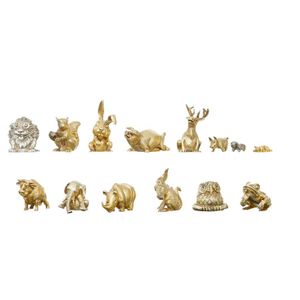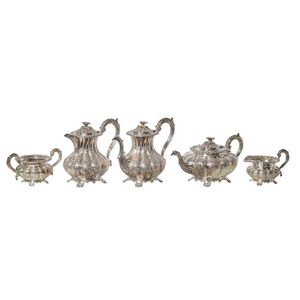Victorian-style Old Sheffield Plate Tea & Coffee Service
You must be a subscriber, and be logged in to view price and dealer details.
Subscribe Now to view actual auction price for this item
When you subscribe, you have the option of setting the currency in which to display prices to $Au, $US, $NZ or Stg.
- Sheffield Plate - Sheffield plate was the first commercially viable method of plating metal with silver. The method of plating was invented by Thomas Boulsover, a Sheffield Cutler, in 1743 and involved sandwiching an ingot of copper between two plates of silver, tightly binding it with wire, heating it in a furnace and then milling it out in to sheet, from which objects could be made.
Originally used by its inventor to make buttons, the potential of the material was quickly realised, and soon it was being used to fashion boxes, salvers and jugs, and not long after that candlesticks and coffee pots, and other traditional tableware.
Although there was a considerable saving in the amount of silver used, Old Sheffield Plate manufacture was more labour intensive than solid silver, meaning higher labour costs. This meant that Old Sheffield Plate was very much a luxury product, and only available to the very wealthy.
The thickness of the silver means that many 18th century Sheffield Plate pieces still have a good layer of silver, while electroplated pieces (EPNS), may have been replated several times over their lifetime. Where the silver has worn off the Sheffield plate the soft glow of the copper base can be seen underneath. However this is not an infallible guide that the piece is Sheffield Plate, as many EPNS items were also plated on to a copper base.
Most Sheffield plate items are unmarked, whereas most elecroplated items display manufacturers names or marks, quality indications such as "A1", "EP", together with pattern or model numbers.
Sheffield plate was made commercially between 1750 and 1850. - Victorian Period - The Victorian period of furniture and decorative arts design covers the reign of Queen Victoria from 1837 to 1901. There was not one dominant style of furniture in the Victorian period. Designers used and modified many historical styles such as Gothic, Tudor, Elizabethan, English Rococo, Neoclassical and others, although use of some styles, such as English Rococo and Gothic tended to dominate the furniture manufacture of the period.
The Victorian period was preceded by the Regency and William IV periods, and followed by the Edwardian period, named for Edward VII (1841 ? 1910) who was King of the United Kingdom and the British Dominions and Emperor of India for the brief period from 1901 until his death in 1910.
This item has been included into following indexes:
Visually similar items

A large silver Repousse Amulet pendant, Shiva, Bheru, Rajasthan, 19th century, the embossed design of Shiva with four arms surrounded by other symbols within a raised frame, length 12 cm, weight 66 g

A Chinese porcelain bowl in the Qing style. An underglaze blue and white bowl raised on a small circular foot overpainted in enamels with green foliage in a continuous design to the exterior with a red border to the base, and with tendrils and flora intern

Lladro girl figure, 25 cm high approx. & a Nao dog figure

A group of Fouteen sterling silver Stuart Devlin animals, each hallmarked, various dates, mostly gilded, (14)
